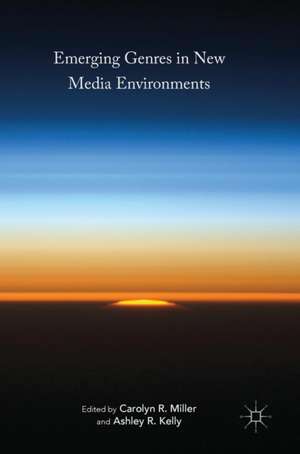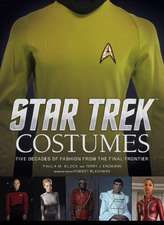Emerging Genres in New Media Environments
Editat de Carolyn R. Miller, Ashley R. Kellyen Limba Engleză Hardback – 15 dec 2016
This volume explores cultural innovation and transformation as revealed through the emergence of new media genres. New media have enabled what impresses most observers as a dizzying proliferation of new forms of communicative interaction and cultural production, provoking multimodal experimentation, and artistic and entrepreneurial innovation. Working with the concept of genre, scholars in multiple fields have begun to explore these processes of emergence, innovation, and stabilization. Genre has thus become newly important in game studies, library and information science, film and media studies, applied linguistics, rhetoric, literature, and elsewhere. Understood as social recognitions that embed histories, ideologies, and contradictions, genres function as recurrent social actions, helping to constitute culture. Because genres are dynamic sites of tension between stability and change, they are also sites of inventive potential. Emerging Genres in New Media Environments brings together compelling papers from scholars in Brazil, Canada, England, and the United States to illustrate how this inventive potential has been harnessed around the world.
| Toate formatele și edițiile | Preț | Express |
|---|---|---|
| Paperback (1) | 582.95 lei 43-57 zile | |
| Springer International Publishing – 11 iul 2018 | 582.95 lei 43-57 zile | |
| Hardback (1) | 786.36 lei 43-57 zile | |
| Springer International Publishing – 15 dec 2016 | 786.36 lei 43-57 zile |
Preț: 786.36 lei
Preț vechi: 958.98 lei
-18% Nou
Puncte Express: 1180
Preț estimativ în valută:
150.47€ • 157.52$ • 124.50£
150.47€ • 157.52$ • 124.50£
Carte tipărită la comandă
Livrare economică 07-21 aprilie
Preluare comenzi: 021 569.72.76
Specificații
ISBN-13: 9783319402949
ISBN-10: 3319402943
Pagini: 351
Ilustrații: XVIII, 308 p. 7 illus.
Dimensiuni: 148 x 210 x 24 mm
Greutate: 0.57 kg
Ediția:1st ed. 2017
Editura: Springer International Publishing
Colecția Palgrave Macmillan
Locul publicării:Cham, Switzerland
ISBN-10: 3319402943
Pagini: 351
Ilustrații: XVIII, 308 p. 7 illus.
Dimensiuni: 148 x 210 x 24 mm
Greutate: 0.57 kg
Ediția:1st ed. 2017
Editura: Springer International Publishing
Colecția Palgrave Macmillan
Locul publicării:Cham, Switzerland
Cuprins
1.Where Do Genres Come From? by Carolyn R. Miller.- Section Introduction: Medium.- 2.Bridge to Genre: Spanning Technological Change, by Janet Giltrow.- 3.Remediating Diagnosis: A Familiar Narrative Form or Emerging Digital Genre? by Lora Arduser.- 4.Russian New Media Users’ Reaction to a Meteor Explosion in Chelyabinsk: Twitter versus YouTube, by Natalia Rulyova.- 5.Resisting the “Natural”: Rhetorical Delivery and the Natural User Interface, by Ben McCorkle.- 6.Expansive genres of play: getting serious about game genres for the design of future learning environments, by Brad Mehlenbacher and Christopher Kampe.- Section Introduction: Genre Transformation.- 7.From Printed Newspaper to Digital Newspaper: What Has Changed? by Jaqueline Barreto Lé.- 8.Cross-culturally Narrating Risks, Imagination, and Realities of HIV/AIDS, by Huiling Ding.- 9.Source as Paratext: Videogame Adaptations and the Question of Fidelity, by Neil Randall.- 10.Atypical Rhetorical Actions: Defying Genre Expectations on Amazon.com, by Christopher Basgier.- Section Introduction: Values.- 11.Autopathographies in New Media Environments at the Turn of the Twenty–First Century, by Tamar Tembeck.- 12.Sentimentalism in Online Deliberation: Assessing the Generic Liability of Immigration Discourses, by E. Johanna Hartelius.- 13.Collected Debris of Public Memory: Commemorative Genres and the Mediation of the Past, by Victoria J. Gallagher and Jason Kalin.- 15.Hard Ephemera: Textual Tactility and the Design of the Post-Digital Narrative in Chris Ware’s “Colorful Keepsake Box” and Other Nonobjects, by Colbey Emmerson Reid.- 16.Genre Emergence and Disappearance in Feminist Histories of Rhetoric, by Risa Applegarth.- Postscript: Futures for Genre Studies, by Ashley Rose Kelly
Notă biografică
Carolyn R. Miller is SAS Institute Distinguished Professor of Rhetoric and Technical Communication, Emerita, at North Carolina State University, USA, where she taught from 1973 to 2015. Miller is a rhetorical scholar and author of the seminal article “Genre as Social Action” (1984).
Ashley R. Kelly is an Assistant Professor of English at the University of Waterloo, Canada, and researches new and emerging genres of science communication.
Textul de pe ultima copertă
This volume explores cultural innovation and transformation as revealed through the emergence of new media genres. New media have enabled what impresses most observers as a dizzying proliferation of new forms of communicative interaction and cultural production, provoking multimodal experimentation, and artistic and entrepreneurial innovation. Working with the concept of genre, scholars in multiple fields have begun to explore these processes of emergence, innovation, and stabilization. Genre has thus become newly important in game studies, library and information science, film and media studies, applied linguistics, rhetoric, literature, and elsewhere. Understood as social recognitions that embed histories, ideologies, and contradictions, genres function as recurrent social actions, helping to constitute culture. Because genres are dynamic sites of tension between stability and change, they are also sites of inventive potential. Emerging Genres in New Media Environments brings together compelling papers from scholars in Brazil, Canada, England, and the United States to illustrate how this inventive potential has been harnessed around the world.
Caracteristici
Explores cultural change over time as revealed through the creation and emergence of new media genres Includes attention to visual and multimodal genres (19th-century photography, public commemorative sites, digital artistic works, videogames) as well as text-centric genres Incorporates contributions from multiple disciplines (art history, communication, education, composition, game studies, literature, rhetoric and technical communication) and multiple countries (Brazil, Canada, the UK and the US) Connects new media studies, rhetorical analysis and cultural innovation and transformation through genre theory











